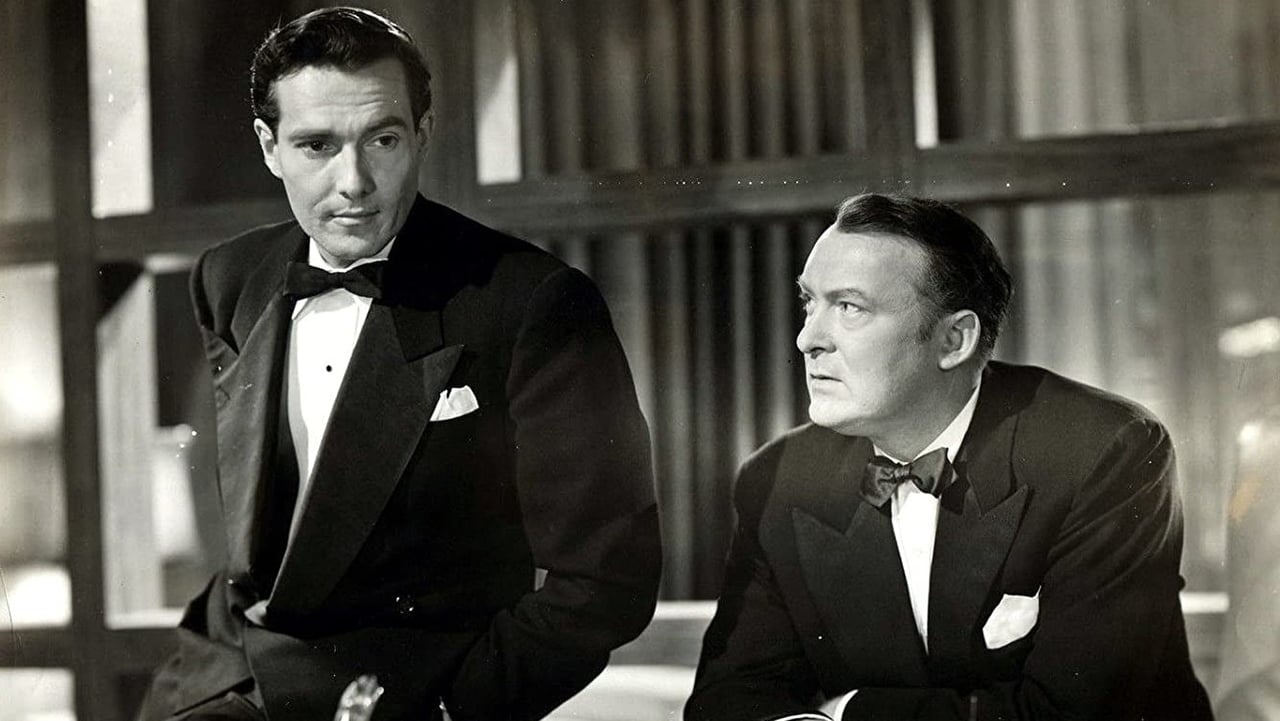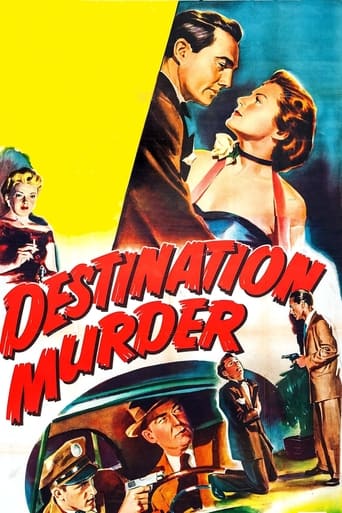2freensel
I saw this movie before reading any reviews, and I thought it was very funny. I was very surprised to see the overwhelmingly negative reviews this film received from critics.
mraculeated
The biggest problem with this movie is it’s a little better than you think it might be, which somehow makes it worse. As in, it takes itself a bit too seriously, which makes most of the movie feel kind of dull.
Nayan Gough
A great movie, one of the best of this year. There was a bit of confusion at one point in the plot, but nothing serious.
Ava-Grace Willis
Story: It's very simple but honestly that is fine.
RanchoTuVu
Rather than let the police solve the murder of her wealthy father, the daughter (Joyce McKenzie) enters into the shady underworld to find the responsible party behind her father's murder. This underworld centers around a swanky nightclub named "The Vogue", with Steve Gibson and the Red Caps as its in-house musicians. Upstairs resides the club's presumed owner, a hulky Mr. Armitage (Albert Dekker) and his presumed assistant Stretch Norton (Herd Hatfield). McKenzie works her way upstairs by getting in close with the actual shooter, a messenger boy named Jackie Wales (Frank Clement), who agreed to kill her father for five thousand dollars. Why the decision to kill the father was taken seems ridiculous, but things move along fairly well, as Mr. Armitage makes a fine role in the collection of B movies sadistic bad guys, as he takes care of business while a player piano churns out Chopin. Dekker's role resembles something Raymond Burr might have played in a better funded post-war crime drama. Nonetheless, the director Edward L. Cahn finds some excellent scenes to fill up the screen.
tedg
The story is good because it is plotted well. It starts with a Ted-friendly fold: a guy is in a movie with his girl. He takes a break and kills someone and returns as if the murder was a movie. Well, it is.What follows is a collection of tough guys and dolls navigating through different interlocked schemes to cheap each other in some way. A few die. The good plotting comes from the intricate interlacing of the perfidy. The hero here is a mobster's "good" daughter who goes under cover to find the killer of her dad. The formula would have her won and lose both. She doesTed's Evaluation -- 2 of 3: Has some interesting elements.
Robert J. Maxwell
Couldn't get with it. My aesthetic apparatus fused. Stanley Clements is hired by thugs Albert Dekker and his sub rosa boss, Hurd Hatfield, who is posing as Dekker's night club manager, Stretch. Stretch might or might not be an invert. He keeps saying, "I don't like dames," and he slaps people lightly across the cheeks. Clement's mission: Wearing his messenger uniform, he must take a quick break during a movie intermission and shoot Dekker's business rival, which he does. Then he scoots back to the theater and resumes his date.The police have their eye on him but can do nothing. But the victim's daughter, Joyce Mackenzie, has him under suspicion too and she is in a position to do something about it. She can and does put some moves on Clements, who must be listed among the most stupid murderers on record. He seems to have no idea that the past shapes the present and influences the future. His thought processes are rudimentary. She's a neat dame -- classy, y'know?, and, okay, so he murdered her old man in cold blood. So what? Let bygones be bygones. That's his philosophy.He decides that the hit is worth a bit more than he was paid so he noodges Dekker up for more money -- five grand. This is a big mistake. Dekker smoothly removes and folds his belt in front of the terrified, diminutive Clements, while Hurd Hatfield turns on the player piano and we hear the gloomy melody and dark chords of the Moonlight Sonata.Clements emerges later from the apartment, disheveled, blooded, dizzied. Then we get to know bar girl Myrna Dell, who tells Clements how to do blackmail right. (You write a complete confession and arrange to have it sent to the cops in case anything happens to you.) Myrna Dell is one tough cookie. She has no sense of humor at all. And she seems made of cast iron, with a figure resembling a Franklin stove. She doesn't always give good advice. Two thirds of the way through the movie, the pathetic Stanley Clements disappears, much to the viewer's relief.The climax is unforgettable. As another viewer pointed out, so many improbables are involved that it's a miracle out of scripture. I guess I'll take a stab at describing it.First, the treacherous Hurd Hatfield decides to have Dekker killed off. Here's how he arranges it. He invites Mackenzie, the vengeful daughter of the murdered man, to his apartment. Then, when Dekker arrives, as secretly arranged, he stashes Mackenzie in another room. He then drugs Dekker, sits his wobbly body upright in a chair, fires a pistol into the wall, clasps the pistol in Dekker's obligingly upright hand, cowers behind the desk, cries out for mercy -- and Mackenzie rushes in from the next room, having overheard Dekker's confession, picks up another pistol lying there, and shoots the oblivious Dekker, who is posed as if to plug Hatfield, perhaps in a state of cerea flexibilitas. Hatfield winds up plugged too, but I forget how. I think I was still abstracted by the knots in Dekker's murder or maybe it was a period of microsleep.Well! There are two things that can DEFINITELY be said about this production. Hurd Hatfield certainly had a long career. From 1944 to 1991. And there's another thing. James Flavin plays a cop and he says "sqawd care" (New England, for "squad car". Twice.) Is there anything else to be said about this movie? Let me think.Nope.
krorie
This nifty little programmer from the post-World War II era gives viewers a chance to see several second-lead actors strut their stuff. The weasel-eyed Stanley Clements who made a living playing gunsels and Bowery types gets a chance to play, yes, a playboy hit man. It's a good thing he had money and a sporty-looking car to supplement his looks. Albert Dekker as Armitage does fine in a difficult role, having to play two facets of the same character. Alice Wentworth (Myrna Dell) turns out to be a femme fatale failure in the movie, but not in the acting department--seems the blonde bombshell is just not smart enough to pull off her double dealings. The lead part of Laura Mansfield is portrayed by Joyce Mackenzie, sort of a poor woman's Barbara Hale. Then there's Hurd Hatfield as the sneaky Stretch Norton, a pivotal part that fits his talents perfectly.The story involves a murder man's daughter tracking down the person responsible for her father's death, since she is led to believe that the police aren't really doing their job. She begins dating the trigger man, hoping he will lead her to the mastermind. The trail leads to a nightclub operated by mobsters. The nefarious Armitage has a nasty habit of torturing and killing his victims to the tune of Beethoven's "Moonlight Sonata." He is also adept at using his belt to silence those who disagree with his methods or who attempt to extort money from him. The plot has a major twist toward the middle of the film. It's surprising that other writers and directors haven't expropriated it (politically correct for stealing). As with most noir-like films of the period, music serves a vital link between story and character development. "Moonlight Sonata" has already been noted. Listen to the words of the songs sung by the popular jump and jive group Steve Gibson and the Redcaps (early doo wop). At times the musical selection can even be ironic. For example, just before Armitage gives Jackie Wales (Clements) the treatment, the Redcaps blast away with, "Let's Go To A Party."

